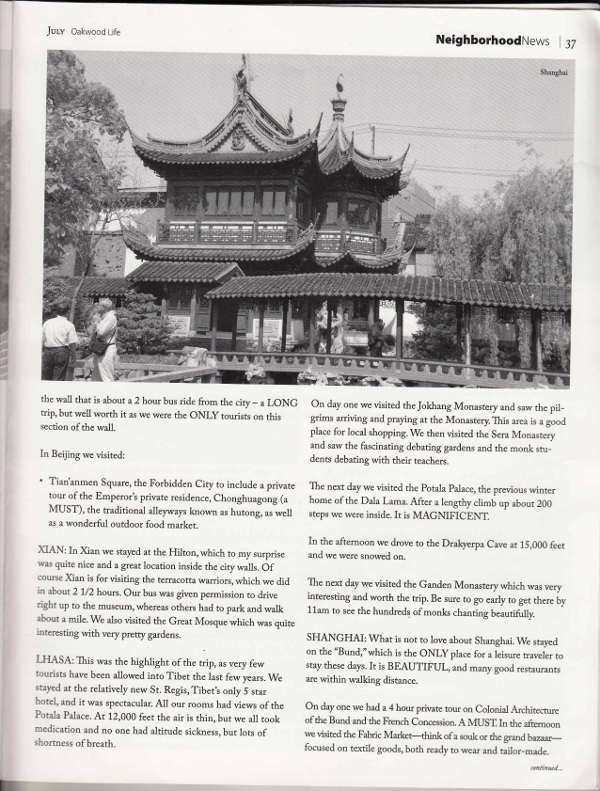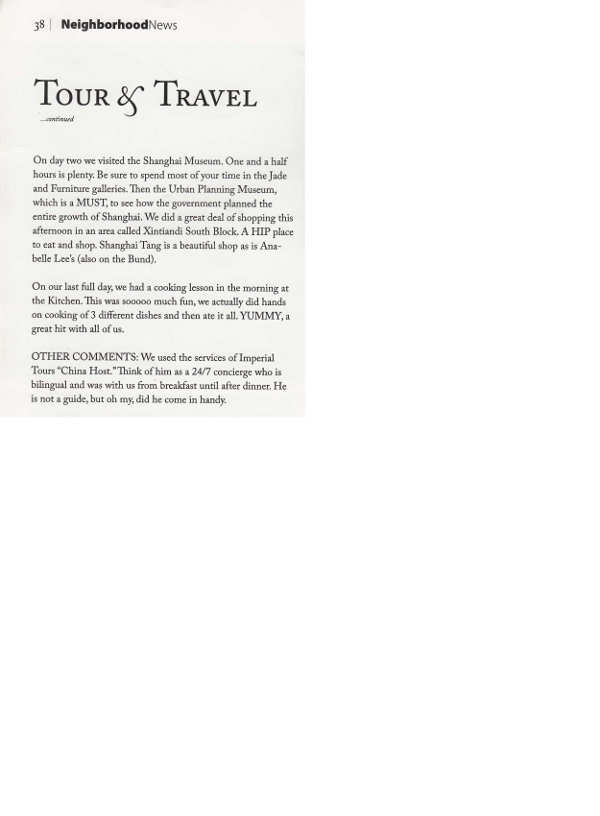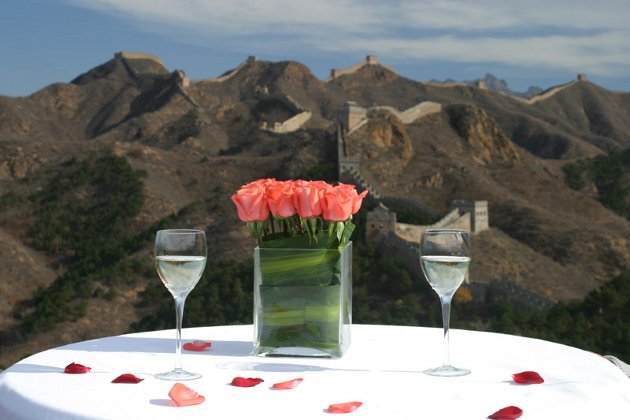It's getting late on a Thursday night. You have a big FIT itinerary to sort out before you leave the office so you order in some Chinese takeaway and put your head down to finish the job. The sky is darkening outside the window pane when all of a sudden there is a blinding flash of light and a flying saucer swoops out of the night sky to hover to a standstill outside your office. A steel platform unrolls, a door opens and a red and green alien slithers like a massive snail down the platform and into your office.
"I looked up your agency on the internet as I came out of hyper-space, and wonder if you can help me with a travel question," explains the alien using a translation application. In your open-mouthed amazement, you say nothing. The alien continues, "I am on an intergalactic journey and only have 10 days on your planet. I don't want to rush unnecessarily. I have the wife and kids in the back of my saucer and I want to show them the best that Earth has to offer. It's our first time here. My friends told me that both Italy and China have had a massive impact on your civilization and so I wanted to ask your advice on which one I should visit?"
Before you can say anything, your colleague answers, "Over the past thirty years, we have had great success with earthlings in Italy and so we know it like the back of our hand. By contrast, China is a bit of an unknown quantity to us, and so we would strongly recommend Italy for your first ten days on our planet."
"I was expecting you to say that," retorts the alien knowingly, "because I was pulling up the data and saw that most luxury travel agents sell fifty to sixty times more Italy than China. What you are recommending ties in with the last 30 years of your travel sales. Thing is I don't feel it's as clear cut as that. After all China and Italy both have beautiful landscapes, amazing cuisines, friendly people and stunning cultural sites. But as we were flying in, my wife got involved and she looked up the price of the Cipriani. Do you know what an entry level room goes for! Meanwhile, the Peninsula Shanghai which won best Virtuoso hotel two years ago is a fraction of the price… Similarly, we looked up the average room size at the Hotel de Russie in Rome and compared it to that of the Shangri-la China World Summit Wing in Beijing… do you know the size difference? And then my daughter found this terrific little company called Imperial Tours who can do all kinds of cool things like a banquet on the Great Wall or a private gondola with orchestra on Hangzhou's West Lake. She asked me how much it might cost to organize a banquet in the Colosseum and whether union rules would allow for an orchestra inside a gondola in Venice? It seemed to us that China would be about 40-50% cheaper than Italy on a like for like basis, offering a similar level of quality and a similarly amazing set of experiences.
At this point, there is a ring on the door bell and in walks the Chinese delivery man, bringing the food you ordered earlier. "I couldn't help but overhear your conversation from outside the door," he begins. Turning to the alien he adds, "but there is one thing that China has that Italy doesn't have, nor France, nor the UK, nor Switzerland, nor the rest of this agency's top selling destinations."
"What's that?" asks the alien.
"The Future," he answers.
Then turning to you and your colleague, he continues "and there's something else that you might also not know. According to data from Virtuoso, a luxury travel consortium, travel agents on average make 2.3 times more selling China than other destinations because people go for longer and usually require more services when they're there."
—
So the question now is: on which side of history do you want to be? Do you want to continue to reflect what's happened on planet earth for the past 30 years, or do you want to be on the right side of the future and invest in learning about China?

 When Rubin moved to China in 1994, he was surprised to find a dearth of resources for discerning travelers in a country so rich in cultural heritage and natural beauty. He and his wife and partner, Nancy Kim, set out to change that, and now lead China’s most ambitious luxury tour operator. To keep up with the country’s rapid transformation, Rubin is constantly inspecting new hotels—Beijing has seen the arrival of a Waldorf Astoria; a Rosewood and another Mandarin Oriental are still to come—and developing new experiences. In Hangzhou, he can set up a tour of a pharmacy and museum with a practitioner of Chinese medicine; in Shanghai, he’ll arrange a nightlife tour that explores the jazz scene.
When Rubin moved to China in 1994, he was surprised to find a dearth of resources for discerning travelers in a country so rich in cultural heritage and natural beauty. He and his wife and partner, Nancy Kim, set out to change that, and now lead China’s most ambitious luxury tour operator. To keep up with the country’s rapid transformation, Rubin is constantly inspecting new hotels—Beijing has seen the arrival of a Waldorf Astoria; a Rosewood and another Mandarin Oriental are still to come—and developing new experiences. In Hangzhou, he can set up a tour of a pharmacy and museum with a practitioner of Chinese medicine; in Shanghai, he’ll arrange a nightlife tour that explores the jazz scene.
Trend watch Rubin has seen increased interest in Chengdu, which is home to the giant panda, the heart of Sichuan cuisine, and the jumping-off point for a visit to the ancient archaeological site of Sanxingdui. A Ritz-Carlton recently opened in the city, and Temple House and a Six Senses are opening soon.

Rubin is one of the most sought-after tour operators in China for luxury travel, a field that has changed dramatically in the 16 years that he’s been in the industry. He exhaustively researches new openings—the Banyan Tree Shanghai; the Mandarin Orientals in Guangzhou and Shanghai—and cultivates local contacts that lead to insider experiences: a helicopter ride from Beijing to the Great Wall, instruction in the game of weiqi, or a private calligraphy lesson.

This past June, Guy and I were fortunate enough to be invited by Shangri-la Hotel to their new hotel in Lhasa as a part of their Advisory Board meeting (Guy is on the board). I hadn’t been to Lhasa in almost ten years and the last time we were there, the Lhasa Hotel was the best on offer. Since then, both the Shangri-la and St. Regis hotels have opened, giving luxury travelers a chance to experience this unbelievable culture without having to sacrifice those creature comforts with which we’ve become all too accustomed.
The St. Regis has now been open for 6-7 years and unfortunately, time is already taking its toll. Fortunately though, the Shangri-la has opened and within one week of opening, managed to satisfy and surpass the expectations of some of the travel industry’s most elite members.
The Shangri-la is located in the west, outside the old city, but very close to the Norbulingka (the Dalai Lama’s Summer Palace). Another nice feature is that it is located next to an older Tibetan village so that as you drive up to the hotel, you see traditional Tibetan rooftops, giving you a real sense of place. The hotel also tries to keep Tibetan elements alive throughout the hotel, whether it be in patterns in upholstery and woodwork, the dress of the front desk staff, to traditional breakfast items at the morning buffet.
The room product is amongst the best in the city, with entry level starting at 43 sqm and some on the upper floors with distant views of the Potala Palace. The next category is a Premier room which is very nice at 61 sqm. There are also several types of suites, with the entry Executive Suites consisting of a separate living room and bedroom and 1.5 bathrooms and very comfortable. Larger suites had not yet opened.
Food in the hotel was great in a city where many ingredients need to be imported. We were treated to a wide array of cuisines from fusion Tibetan (since yak butter mixed with tsampa or raw barley isn’t to everyone’s liking), to Western bbq with delicious local purple yams and lamb to refined Chinese. The breakfasts were also plentiful with something for everyone.
All in all, the Shangri-la is a highly welcome addition to the Lhasa hotel scene.
 Guy – Why was Beijing Tourism Administration (BTA) changed into Beijing Municipal Commission of Tourism Development (BTD)?
Guy – Why was Beijing Tourism Administration (BTA) changed into Beijing Municipal Commission of Tourism Development (BTD)?
Vice-Director Gao – Thanks Guy for inviting me to do this interview. It is my pleasure to introduce Beijing to the travel community. To answer your question – in the Beijing government structure a “Commission” ranks higher than an “Administration” and a “ Commission” has yet more coordination power and a bigger budget than an “Administration ”. This shows the increased respect with which the government views the travel industry. As a Municipal Commission, we have more power to co-ordinate other industries, and this is one of the key reasons for the change. The government realized that travel affects and includes many industries, such as culture, sports, education, agriculture, marine and more. So rather than encouraging travel as one sector, the government felt it needed to be managed as an industry interlinked with many others. In order to co-ordinate aspects of various industries within an umbrella of travel, Beijing Tourism Administration was promoted with the status of Commission in 2011. At the same time, BTD was given a much bigger budget. Our annual budget is now 1 billion RMB (approximately 163 million US$), of which half should be spent on industrial development, for example developing infrastructure and functional areas and half on promotional activities and others.
Guy – 1 Billion RMB a year! That being the case, why do people overseas not see more promotional information about Beijing?
Vice-Director Gao – Please see this in the context of the changes taking place within China at large. These days the central government wishes to let the invisible hand of the market play a greater role in shaping industry. This is a wide-ranging policy shift and one that needs time to develop and mature. We currently focus more on infrastructure development, tourism planning, personnel training and education. To date, a limited portion of our funds have been used overseas because the government needs to learn about the kinds of marketing partnership that will be most effective. As time passes, we will dedicate more funds to overseas promotion with the stronger partnership of Public Sector and Private Sector.
Guy – Can you outline your role within BTD?
Vice-Director Gao – Sure, but first let me give you background on the nature of travel to Beijing. In 2012, there were around 231 million visitors to Beijing and only 5 million of these were from overseas. Whereas in the past, tourism authorities used to focus on increasing tourism numbers to their destination, now we want to focus on the quality of those stays. We want to increase the yield to the city by lengthening each individual stay or increasing the total expenditure of each visitor. We look at high end tourism as a means of achieving our aim, and I am part of the high end tourism development department which is tasked with achieving this. This department subdivides into three areas – MICE (Meetings, Incentive, Conference and Events), Luxury travel (FIT travel) and what we call Specialized Travel. This latter one covers specialized forms of travel that often have high yields such as medical travel, educational travel or various forms of sports tourism.
Guy – What steps have you taken to engage with these markets?
Vice-Director Gao – This is happening on two levels. Firstly, we have worked to increase the public exposure of Beijing to the wider global travel community, and then secondly we have taken steps to foreground Beijing’s suitability for the MICE market.
Apart from regularly sponsoring FAM trips for agents and media, we have sent “Kungfu Pandas” to the UK and Ireland in 2012 and then in 2013 to USA and Canada. Our marketing campaigns have included sponsoring a Royal Albert Hall performance in London by Swedish rock pianist Robert Wells together with famous Chinese singer Madame Tan Jing and we have developed multi-million dollar shows for New Year’s Eve celebrations in the Temple of Heaven and in the Summer Palace in 2011 and 2012, images that went all around the world on the stroke of midnight. In October 2013, there will be a pull-out section of Travel + Leisure magazine in the US and we have also placed some advertising in One +, the MPI magazine.
On a more specific level, we have been working particularly in the MICE area. We have sponsored delegations of Beijing travel companies at CIBTM (co-hosted by Beijing Municipal Commission of Tourism Development), EIBTM and IMEX Frankfurt for the past few years. At the same time, the government’s role is also to increase communication with international organizations. Thus, we hosted the WTTC conference in 2010, PATA’s 60th anniversary event in 2011 and followed this in 2012 by hosting the Site Global Conference. These major events increased Beijing’s exposure. We also have fostered dialogue with ICCA and MPI and launched the first Skal chapter in China in Beijing in August15, 2012. Another exciting development was that in 2012, Beijing together with other cities, such as Berlin, Los Angeles and others launched the World Tourism Federation with its secretariat to be based in Beijing, which will create a broader platform for international tourism community.
Guy – So what do you feel BTD needs to do to attract more MICE business to China?
In 2011 we launched the BCVB (Beijing Convention & Visitor Bureau) and formed the Beijing High End Tourism and Meeting Industry Alliance, a committee comprising industry and government representatives to move MICE forwards. I feel to further MICE, what we need to do is firstly to co-ordinate and mobilize the abundant resources for MICE. I mean we need to present further and better the spa, golf, restaurants and ancillary services and to foreground these in the MICE offering. Secondly, we need to ask for business from industry leaders in Beijing who could do a better job of inviting conferences to Beijing. I feel that Beijing has a fantastic sales proposition for MICE. Planners want something different and unique. Beijing offers both historic event venues like the Great Wall and the Forbidden City as well as futuristic ones like the Water cube. The amazing cultural highlights and the attraction of one of the biggest consumer markets in the world are at the core of bringing MICE business to China.
Guy – Do you feel airlift is holding back Beijing’s development of the MICE market?
The air ticket fee is a factor in competing with international destinations, and we are working closely with Air China and other airlines in a win-win situation to try and entice more business travelers to Beijing. Similarly, the increasing strength of the RMB is another factor. However, these need to be balanced in the overall business decision. China will soon have the largest consumer market in the world. How exciting a proposition would it be for many business people to hold their event in the capital city of this market? Many competing factors need to be considered to come to a balanced decision for a business about where to hold their events and we feel that Beijing offers a compelling case.
Let me pre-empt your next question and say something about air pollution. The pollution starting in winter 2012 was bad, and the situation remains unsatisfactory today. Nonetheless, I am confident that in the next few years Beijing will overcome its challenges in this area. Beijing government recognized in February 2013 that there is a problem and has issued aggressive targets for pollution reduction by 2017. I really believe we will succeed in this.
So the Chinese people are friendly, we have excellent hotels and we warmly invite you to hold your event here in Beijing and to see what our society, different from yours, but still wonderful and successful looks and feels like.





While Imperial Tours is primarily known for its luxury private tours, this fall we are offering our Majestic Tour, a 10-night small group tour (maximum 16 people) covering Beijing, Xian, Hangzhou and Shanghai. This is a great way for people who prefer the camaraderie of other travelers to experience must-see China…in style. Highlights include:
The dates are October 10-20, 2013. The price is $8500 per person based on double occupancy. Email Priscilla Tan to request an itinerary and reservation form, suite or first class upgrade pricing, single supplement pricing, or for pre/post hotel stays and touring options.
 My good friend Ling, a successful Chinese-American business woman, recently spent a whole night on the internet during her travels organizing her onward air tickets. She wanted to get from Beijing to Lombok in Indonesia to join us for a vacation, and then fly on to Vienna. I asked her the obvious question, “Have you thought of asking a travel agent to do that for you?”
My good friend Ling, a successful Chinese-American business woman, recently spent a whole night on the internet during her travels organizing her onward air tickets. She wanted to get from Beijing to Lombok in Indonesia to join us for a vacation, and then fly on to Vienna. I asked her the obvious question, “Have you thought of asking a travel agent to do that for you?”
She hadn’t and many of her generation think similarly, yet there are professionals out there whose job it is to take the sting out of such arrangements. What is shocking is that good travel agents will usually do this for a minimal fee, which together with their commission adds a small overall cost to you, the client, and yet saves untold hassle and time. And there’s the answer to the first part of my title above – that’s how good travel agents conceal and indeed undermine their incredible value.
Members of the public infer from their low cost that travel agents can’t add much value. And yet how differently would we feel if they charged a lot more, like other professionals such as accountants or lawyers? At that point, we’d expect them to work for their higher fee. We’d insist on their getting us the best value for money. We’d require their matching us with the exact right suppliers for what we wanted anywhere in the world, whether it be hiking in Patagonia, test-driving a Porsche on the autobahn or fly-fishing in western Mongolia. We’d want them to manage our travel expenditure so much more effectively with far better results than we could ever hope to attain. And do you know what? That’s exactly what good travel agents do for a living. And not only that.
The really good travel agents commit their business and a large bulk of their personal time to you. It’s partly for money, and it’s partly because they are wired that way. Please do not take advantage of them now that I am letting you into this secret, but these are people who stay up in the middle of the night because they are so concerned you are having a terrific time on safari in East Africa. They will be writing notes to the Directors of Sales at every lodge to ensure you are being looked after. So the travel agent’s commission not only gets you the best travel advice money can buy, it not only manages your travel expenditure better than you could yourself, but with really great travel agents, it buys you someone who is passionate about your travels being successful. Given that we all work so hard in our lives – shouldn’t our quality of life be assured by maximizing our leisure time? Introducing the value of a good travel agent….
Now let’s look at this from the other end of the telescope. Let’s pit a savvy internet user, Jo Shmo, against the good travel agent: let me see now, Jo goes to Tripadvisor to look up a good hotel in Lyon, France for an upcoming trip. He cross-references pricing on hotel web-sites with the hotel’s location on Google Maps to make sure he is getting the best possible deal. And did you notice that? He focused on the room’s price (rather than its value to him) right away. And why? Because that’s all Jo knows about since he’s never been to Lyon – it’s about all he can control, given the haze of data overload he’s dealing with. Does he have the faintest idea where the area of town that interests him is? No. Has he included taxes and the service charge in his comparisons? Probably not. Does he know which room he is getting? Is there a pastry shop nearby for his breakfast, and if not how much is the hotel breakfast? The internet does not easily reveal this information. And anyway, does he know what’s he’s going to be doing once he gets there? Not really. On the one hand, there’s too much information. On the other, none of it seems relevant to his particular situation, because for many people travel, particularly leisure travel, is NOT a commodity. Our travel aspirations are as unique as we are. So, what does Jo do in the end? He picks one hotel thinking, “there are all these positives, how bad can it be?” And in so doing he commits his funds and his travel companions to a potentially awful decision. Was that rational? Was it a good deal? Oh, please! What are we organizing here, a train wreck or a vacation? That is no way to spend your hard-earned cash – it’s penny rich, pound poor.
By contrast, the good travel agent – often someone who has spent a decade or so of his life developing a network of reliable contacts from his inspiring mentor to a range of suppliers across the globe – will meet with you to find out what makes you and your nearest-and-dearest tick. Are you the kind that is into museums or self-indulgence? Do you love fancy-shmancy or are you into clubbing and the real deal? After assessing what makes you you, he will go to his network and choose from a continuum of suppliers covering your desired destination one who matches your needs the best, and it will be they who recommend you a hotel in Lyon, based on their experience of what will work for you. So now you’re not choosing the hotel based on suppositions gleaned from unknown amateurs on TripAdvisor, but instead you’re benefiting from the advice of a network of travel professionals who make their daily crust by making people like you as delighted as possible for the price. Given those two scenarios, which do you think is more likely to deliver on your travel aspirations?
So, whilst a good travel agent’s method of remuneration might conceal some of his cost, it would be a mistake to overlook his value. And then it would be monumentally misinformed to ignore the sheer care the good travel agent provides. A good travel agent is a no-brainer. If you haven’t yet found one, then wait for my next post setting out what to look for and going into more detail on why working through a travel agent makes more sense that working directly with an inbound tour operator, such as ourselves. In my view, this represents the core value of the leisure travel agent, which I touch on above. In the meantime, to start your search for a good travel agent check out our “Find a Travel Agent” web page, continue by checking out the travel agency consortiums, Virtuoso and Signature, and also try asking your friends for a recommendation.

In an era of DIY vacations, travelers have more tools—online travel agencies, review sites, booking apps—at their fingertips than ever before. But when it comes to expert advice about a destination and customization, you can’t beat a good agent.
“Today’s agents provide insider access, learn and understand your desires and personality, and are there for you 24/7, before, during, and after your trip,” says Kimberly Wilson Wetty, co-president and co-owner of Valerie Wilson Travel.
To stay competitive in the age of TripAdvisor, agents like Wetty are trying to appeal to a younger, more tech-savvy clientele by offering what no online service can replicate: personalization. Your agent can offer options (coveted dinner reservations; last-minute romantic surprises) and handle potential mishaps (a missed flight; a dank hotel room; a hurricane; a medical emergency)—services that are well worth the planning fees, which generally range from $75 to $500, and are sometimes already built into the trip cost.
And the advocacy on your behalf doesn’t stop there: the best agents know their beats. Whether it’s South America or culinary travel, they’re already out there, scouting that emerging destination, testing the beds in a new hotel, or vetting a local outfitter.
“More small agencies are homing in on a niche,” says Brian Tan, founder and CEO of Zicasso, a service that connects people with travel advisers.
An agent’s knowledge of a destination translates into quality control and insider experiences you couldn’t arrange on your own. Chicago resident Lindsay Everest was glad she handed over the planning reins to Jet Set World Travel’s Julia P. Douglas for her honeymoon in the Maldives. “Knowing that my husband loves food and wine, Julia arranged for a private, nine-course dinner in an underground wine cellar at Soneva Gili,” says Everest, who is working with Douglas again on an upcoming trip to Bermuda.
This kind of access to special perks—ranging from deeply discounted airline seats to room upgrades—is the result of longstanding industry relationships and memberships in invitation-only travel-agent consortia and cooperatives such as Virtuoso and Signature Travel Network, which are affiliated with hundreds of hotels, airlines, and other hospitality groups.
While the benefits of getting professional advice for your trip are clear, wading through hundreds of specialists and companies can be daunting. To help you find the travel adviser who is right for you, we’ve broken out our list by areas of expertise and outlined a few key questions to ask before you book your next trip.